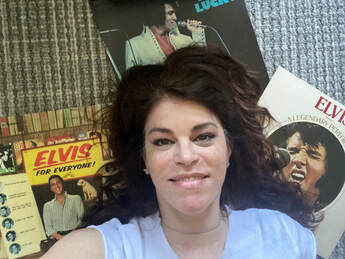 Still have my albums ... Still have my albums ... By the time I was aware of Elvis’s existence, he was in some ways already a has-been in his 30's, and his movies were relegated to the TV. I loved him from the moment I saw him. I was about six years old. Despite being one of four kids in our family, TV watching was often a private affair. Sitting alone watching him felt slightly subversive and comforting. He was a kind, grownup man, not scary, not intimidating (unlike real life in every way), funny even, gentle except when he started to sing. At the age of six his raw sex appeal, his sensual voice, his flirting with all those pretty young women, and them flirting back, was something I experienced as joy. Staring into his face was like falling … long and slow into the arms of some squishy, soft, tingly place that I had never been before and never wanted to leave. I can’t remember if I saw the 1968 TV special in real time, him in that black leather suit sitting in a ring of musicians overflowing with contentment and looking astounding, or whether I’ve just seen clips of it so many times since -- his voice, utterly singular. But that is still my favorite Elvis. I bought his albums when I was a little older and played them on my '70's record player, one in particular, Elvis for Everyone!, until the scratches made it skip constantly. He fell off my radar when he was in his Vegas days. I knew nothing about that time in his life. Then in the middle of August 1977, when I was still a kid on summer vacation, he died. He was the same age as my parents. How could he be dead? How in the world? He was alone in his bathroom. It was the saddest thing I had ever heard. I read the Elvis biography by Albert Goldman, published in 1982, when I was young woman. It, of course, went into detail about the harder stuff, the uglier stuff, the jungle room. I wasn’t entirely surprised by any of it, but it didn’t make me turn away. He had that grip on me that our early childhood influences do. I recently saw the new film, Elvis, and it lifted me out of my chair and left me kind of speechless. I cried hard for the last ten minutes, tears dripping into my mask, snot, the whole thing. I thought the grief and love I was feeling might be only about me and my nostalgia and I was embarrassed by the weight of it, and then I looked at my 24 year old daughter next to me and she too was crying. The movie is an everyman story, believe it or not. All of us want to become, actualize, live as our full selves; it’s just that Elvis’s full self was meteoric when he had it. We watch him find it at a young age, lose it, find it for a short time again, but then be unable to hang on to it. Any story of Elvis is a tragedy, it goes without saying, but this movie brought it home for me like no other version has. Rotten Colonel Parker is ominously there, as his voice guides us through the story; he cannot be shaken off by us or Elvis. Elvis at 23 sits on the floor of his mother’s closet, gripping her clothes, and sobbing uncontrollably after she has died, and we know he’s been changed in a way that will invariably send him down that rabbit hole we so wish he could have avoided. He’s 34 and going out on stage for his first come-back concert in Vegas, ashamed of all those cliché movies, thrilled to be in control of putting his own show together, and terrified that people won’t like it, then he absolutely sets the place on fire. You don’t have to get Elvis, like Elvis, appreciate Elvis, but he is undeniable. The final scene of the movie is a clip of the real Elvis singing in public for the last time, high as a kite, drifting back and forth on the piano bench as someone holds the mic for him, and then he opens his mouth and the sound knocks you back, a howl, a guttural moan, a wail -– “time can do so much”. Some critics don’t like the new biopic because it’s not dark enough, true enough, political enough -- he was an addict, a womanizer, insecure, and desperate to be seen. We know. This is a movie full of grace which is something that is so welcome to me at this moment in our/my collective cultural despair. The story became more and more intimate for me, and there I was back in one of those private moments from my childhood, connected to that fascinating character inside my TV, the innocence and silly sweetness not gone, but now filled in and around with the fullness of a whole, big life. The movie is an opportunity to see Elvis in ourselves -- a compassionate mirror to look into and feel what is possible, and a calling to forgive yourself, as he couldn’t, for where you may have tripped up, or just been human, along the way. My daughter and I walked out of the theater feeling like we’d been to one of the best concerts we’d ever seen. We were buzzing. We had to talk it all through. We kept referring to it for days afterward, and I suspect we will for a long time. Our mantra in mulling over our own current internal battles became be your own Elvis, don’t let the shit stop you, find your Vegas moment, man –- wear the jumpsuit, do the karate moves, and speak. |
Authorplaywright/screenwriter/actor Archives
October 2023
Categories |
 RSS Feed
RSS Feed